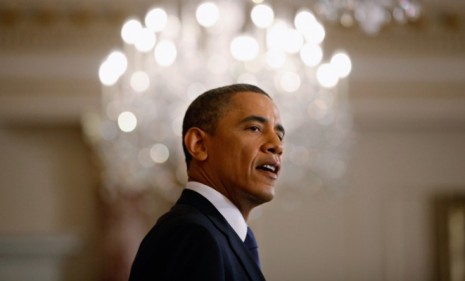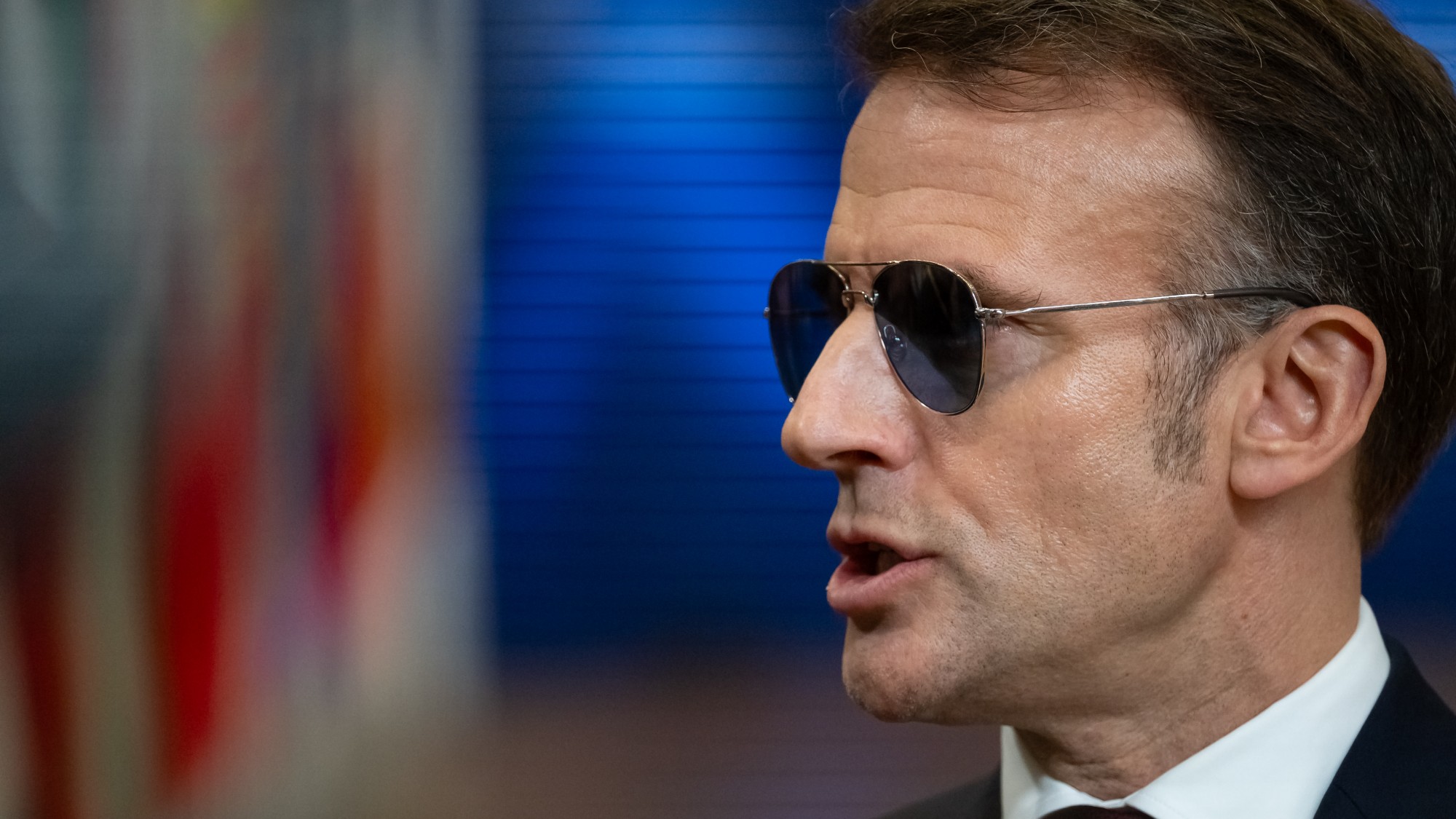Obama's 'disappointing' Mideast speech
President Obama spells out his much-hyped vision for a new U.S. approach to the Middle East in a post-bin Laden world — but was it a letdown?

In a much-hyped speech on Thursday, President Obama said the U.S. would help Tunisia and Egypt enact democratic reforms by offering both countries new aid and investment. He also endorsed, more clearly than ever, the idea of establishing a Palestinian state along pre-1967 borders as a way to settle the Israeli-Palestinian conflict. As well, Obama denounced regimes in Libya, Syria, and Iran for using violence to silence demonstrators demanding greater freedom. Did the president spell out a brave new vision for U.S. policy in the Middle East, or merely make a lot of empty promises? (Watch a clip from Obama's speech.)
This should shake up the status quo: Obama's speech had "some real steel," says Jackson Diehl in The Washington Post. He "bluntly condemned the repression" used to quell Arab protests, and he didn't spare friends, such as Bahrain. The president also prodded Israel by suggesting Palestinian borders they won't like, then "acidly dismissed the plan by Palestinian President Mahmoud Abbas to seek recognition of Palestinian statehood by the United Nations General Assembly this September." As usual, Obama used soaring rhetoric, but it's "those specific zingers" that will shake things up.
"The steel in Obama’s Mideast speech"
The Week
Escape your echo chamber. Get the facts behind the news, plus analysis from multiple perspectives.

Sign up for The Week's Free Newsletters
From our morning news briefing to a weekly Good News Newsletter, get the best of The Week delivered directly to your inbox.
From our morning news briefing to a weekly Good News Newsletter, get the best of The Week delivered directly to your inbox.
Ultimately, this was a letdown: Obama's promise to forgive debts and expand trade with Egypt and Tunisia, and make those nations "models for peaceful change" sounds smart, says Shaun Mullen at The Moderate Voice. But where was the demand that Syrian President Bashar al-Assad, whose repressive tactics have killed hundreds of protestors, step down? And why didn't Obama scold the Palestinian leadership for cozying up to Hamas? The president was supposed to be describing — to Arabs, Israelis, and Americans — his vision for a "post-Osama bin Laden world," but offered "little to chew on."
"Obama's disappointing Middle East speech gives Arabs, as well as Israel, little to chew on"
And his Mideast peace strategy won't work: Now we know what Obama is basing his "entire Middle-East policy" on, says Tony Katz at Pajamas Media. The linchpin is his endorsement of pre-1967 borders as the starting point for Mideast peace negotiations, something Israel opposes. And, given both history and recent events, it's hard to believe Israel could ever be secure under that plan.
"Obama on the Middle East: Pre-1967 borders"
A free daily email with the biggest news stories of the day – and the best features from TheWeek.com
He didn't even break new ground: Despite all the fanfare, says Ed Morrissey at Hot Air, Obama didn't stake out a new position on Mideast peace. "The entire speech could easily have been delivered by George W. Bush." Once again, the White House has "inflated expectations for a major address just to deliver routine white-paper positions and lip service on democratization. The speech was nothing special at all."
"Obama's Cairo II speech: Cheering democratization — in general"
-
 Syria’s Islamic State problem
Syria’s Islamic State problemIn The Spotlight Fragile security in prison camps leads to escape of IS fighters
-
 Quiz of The Week: 17 – 23 January
Quiz of The Week: 17 – 23 JanuaryQuiz Have you been paying attention to The Week’s news?
-
 The Week Unwrapped: What can we learn from a tool-wielding cow?
The Week Unwrapped: What can we learn from a tool-wielding cow?Podcast Plus, have we reached ‘peak billionaire’? When should troops disobey their superiors?
-
 The billionaires’ wealth tax: a catastrophe for California?
The billionaires’ wealth tax: a catastrophe for California?Talking Point Peter Thiel and Larry Page preparing to change state residency
-
 Bari Weiss’ ‘60 Minutes’ scandal is about more than one report
Bari Weiss’ ‘60 Minutes’ scandal is about more than one reportIN THE SPOTLIGHT By blocking an approved segment on a controversial prison holding US deportees in El Salvador, the editor-in-chief of CBS News has become the main story
-
 Has Zohran Mamdani shown the Democrats how to win again?
Has Zohran Mamdani shown the Democrats how to win again?Today’s Big Question New York City mayoral election touted as victory for left-wing populists but moderate centrist wins elsewhere present more complex path for Democratic Party
-
 Millions turn out for anti-Trump ‘No Kings’ rallies
Millions turn out for anti-Trump ‘No Kings’ ralliesSpeed Read An estimated 7 million people participated, 2 million more than at the first ‘No Kings’ protest in June
-
 Ghislaine Maxwell: angling for a Trump pardon
Ghislaine Maxwell: angling for a Trump pardonTalking Point Convicted sex trafficker's testimony could shed new light on president's links to Jeffrey Epstein
-
 The last words and final moments of 40 presidents
The last words and final moments of 40 presidentsThe Explainer Some are eloquent quotes worthy of the holders of the highest office in the nation, and others... aren't
-
 The JFK files: the truth at last?
The JFK files: the truth at last?In The Spotlight More than 64,000 previously classified documents relating the 1963 assassination of John F. Kennedy have been released by the Trump administration
-
 'Seriously, not literally': how should the world take Donald Trump?
'Seriously, not literally': how should the world take Donald Trump?Today's big question White House rhetoric and reality look likely to become increasingly blurred